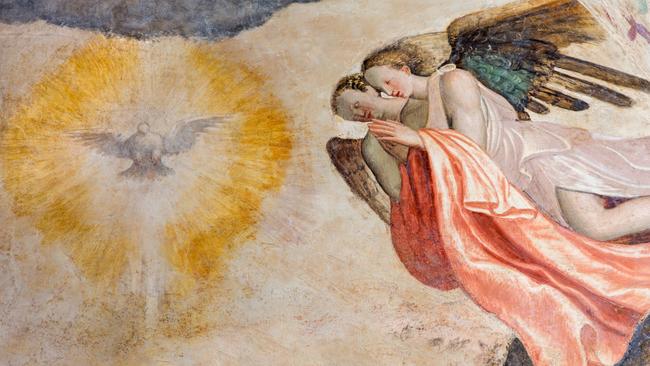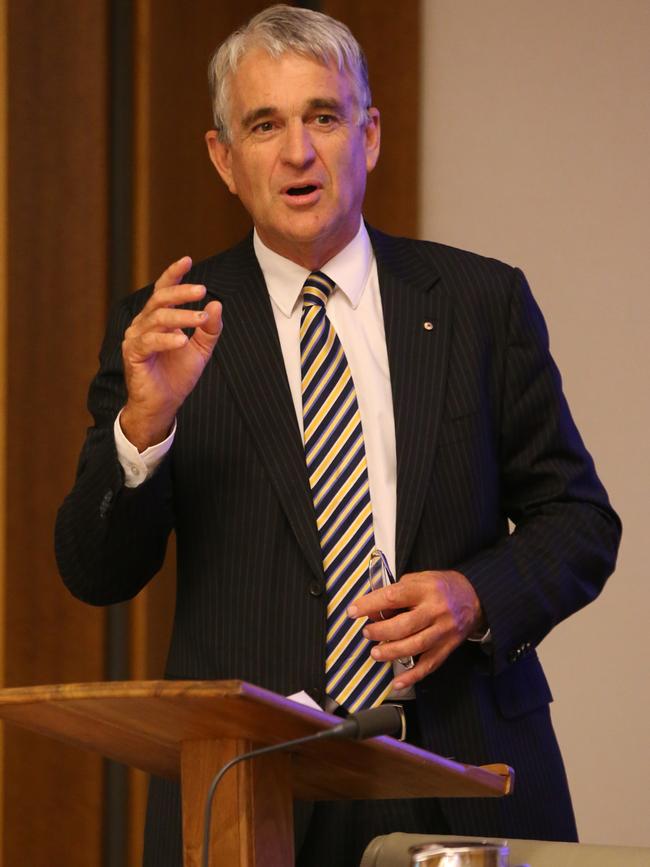We can’t let the aggressive secularists drive out religion
When mere spats turn to hate, we face a civic crisis,

The Machiavellian leaking of “fake news” out of the Ruddock review of religious freedom during the Wentworth by-election and the emotionally charged reaction raises yet again the issue of how 25 million people are going to live together with their deepest ideological and religious beliefs in the vastly different Australia we now live in.
In short, the question is how we are now going to respect diversity and still promote liberty while maintaining the harmony that has been so much the hallmark of our national life.
We must face up to the urgency of the problem: we are atomising and fracturing in the context of the rise of powerful ferment over beliefs and ideologies across the globe. Far from this being “the end of history” or an age of secularism, we are witnessing a global resurgence of religion and ideology.

We are also living through a clash of Western traditions within our own civilisation, between liberal traditionalism and cultural Marxism, both of which emerged out of the Enlightenment. Add to this the emergence of social media, which was supposed to create a virtual global public square, but in the process has also created virtual global tribes, and we a have vast new machinery for transforming civil disagreement into civil hate. These forces are potentially so destabilising that they may threaten our governability.
If we beneficiaries of liberal democracy and human rights better understood our history we wouldn’t be so reserved about affirming religious freedom. History teaches that the long arc of Christian influence on society has proven to be hugely beneficial.
No doubt it is easy to find serious moral blemishes in Christian history, but it was also out of Christianity’s capacity for reform that the solutions evolved. Perez Zagorin in his classic book How the Idea of Religious Toleration Came to the West shows that religious freedom — the beginning of liberalism — largely emerged from Christian tradition in the 16th and 17th centuries.
The great myth is that all of our most cherished values came out of some secular Enlightenment. On the contrary, notions of human dignity and equality arose in the Judeo-Christian tradition hundreds of years before the Enlightenment; and, in any case, for the most part the Enlightenment was not secular. The great Enlightenment document affirming human rights, equality, and liberty — Thomas Jefferson’s 1776 Declaration of Independence — based these ideals on the notion that “all men are created equal” and are “endowed by their Creator” with these rights.
To this day secularists have not found a better foundation.
The anti-slavery movement, perhaps the greatest human rights achievement of all time, drank deeply at the well of Christianity, with the strong religiosity of African-Americans to this day testifying to a collective awareness of Christianity’s emancipatory potential.
The early feminist movement was also made up of many individual Christian women, including the Women’s Christian Temperance Union, which was the major agent behind women getting the vote in South Australia in 1894.
Evangelicals were at the front of 19th-century movements to improve the conditions in factories: Catholic social thought influenced Justice Henry Higgins in the Harvester judgment of 1907, which introduced a minimum “living” wage in Australia.
None of this is even to mention the huge social utility of religion in Australia today, particularly in the founding of charities and levels of charitable giving, as outlined in Greg Sheridan’s brilliant God is Good For You: A Defence of Christianity in Troubled Times. Society benefits from religion, even if not all individuals know it, and thus it is at our collective loss if we hinder religion’s efforts to maintain strong institutions and have a public influence.
But strong religious institutions are made up of strongly religious individuals — that is, individuals who honour the principles of the institution in thought and deed. For this reason as long as we recognise the importance of allowing religious institutions — churches, schools, charities — to exist we must allow them to discriminate in their membership, lest our commitment to freedom of religion and association is just an empty gong.
It cannot be doubted that individuals can be hurt by the exercise of the rights of religion and conscience, just as people can be hurt by other rights such as freedom of speech, association — we all exercise the right to exclude individuals from our circle of friends — and even free trade.
The best way to address this is within the paradigm of liberal freedoms themselves.
In a liberal democracy, if a clash of interests can be resolved without limiting anybody’s freedoms then it should be the preferred way. In the case of religious schools in a highly developed country like Australia, most people have the option of more than just one school to work or study in. Furthermore, as the Ruddock review recommends, schools can develop strategies for making their doctrinal and moral expectations clear from the beginning in a sensitive way, seeking to avoid any unnecessary hurt.
Interestingly, this reflects the diversity of political parties in our system as a vital part of the machinery of our freedom. Politicians argue that voters should have choice, and we as voters embrace choice every time we decide whom to vote for.
The rhetoric of an often aggressive secularism which seeks to drive religion out of the public square fails to grasp that secularism is merely one voice in the pluralist crowd. Contemporary secularists need to accept that while Australia is not as religious as it was a generation ago, it is not the secularist nation they would like. If secularists rejoice that the 2016 census reported that 30 per cent of Australians register “no religion” they must also acknowledge that around 50 per cent of Australians identified as Christian, with continued immigration coming from countries that are less secular than Australia.
Thus, calls for the withdrawal of public funding for religious schools that discriminate are seriously flawed. Such calls covertly define the Australian “public” as secular, as though the religious parents who send their children to religious schools aren’t themselves members of the same public that contributes the funds from which Australian schools are supported. Once we acknowledge that the Australian public remains to a significant degree a religious public — as the 2016 census indicated — then religious schools have as much right to public funding as non-religious schools.
Sir Robert Menzies said that “democracy is more than a machine; it is a spirit. It is based upon the Christian conception that there is in every human soul a spark of the divine.” For Menzies, democracy could work only if we remember that “with all their inequalities of mind and body, the souls of men stand equal in the sight of God”.
In the ridiculing and mocking of the Christian God and his expulsion from the public square, we have also lost the compelling narrative that Menzies so plainly understood for respecting one another that arises from the Christian insistence on loving your neighbour as yourself, even when that neighbour is your enemy.
In the all-too-common circumstances when we find we profoundly and genuinely disagree, we now resort to such levels of hate speech that it is hard to avoid the conclusion that we are faced with a civic crisis. The aggressive secularists who insist on burning down what remains of our cultural house have proved totally unable to point the way to a better dwelling. The 20th century showed us just how hideous secular utopianism can be.
Modern Australia could surely use an infusion of some things traditionally Christian, for example Christianity’s emphasis on humility. When you replace humility with a culture of narcissism and self-righteousness, those with whom we disagree become wicked in our minds. But as Russian dissident Aleksandr Solzhenitsyn said: “The line separating good and evil passes not through states, nor between classes, nor between political parties either — but right through every human heart — and through all human hearts.”
We are also seeing how superficial progressives’ commitment to multiculturalism actually is, for the cultural integrity of religious schools — Christian or otherwise — seems to have no moral force when it comes to the diversity movement. In fact, the demands of diversity are a new form of assimilation. Dare to disagree on cultural grounds with the reigning orthodoxy on gender politics and you’ll immediately find yourself branded a lesser Australian.
Much as I dislike the racial and sexual discrimination architecture in this country, it appears that an overarching religious discrimination act may be the only way to secure as a positive right an acceptable degree of religious freedom in contemporary Australia.
It would need to be very carefully thought through and drafted in order to properly enshrine religious freedom, associational rights, and freedom of conscience as human rights. Ironically, this is necessary to bring us into line with the very international obligations so beloved of today’s social activists.
We are fortunate that in Australia there is indication of a decent majority that values freedom of conscience and religious liberty. The submissions in favour of religious liberty and freedom of conscience to the Ruddock review into religious freedom were overwhelming and, according to polls conducted during the 2017 same-sex marriage debate, a very large majority of Australians are in favour of the protection of religious liberty.
I don’t hear anyone arguing for an extension of religious liberty; rather, it has become patently obvious that effective measures are now needed to simply preserve the freedoms we’ve taken for granted and exercised for so long in laissez-faire Australia. That is because our society is now plainly infused with activists who are determined to use every tool available to enforce their views on others, no matter the cost. And as a result, our cherished social harmony really is now at risk.
John Anderson is a former deputy prime minister and was leader of the National Party from 1999 to 2005.


